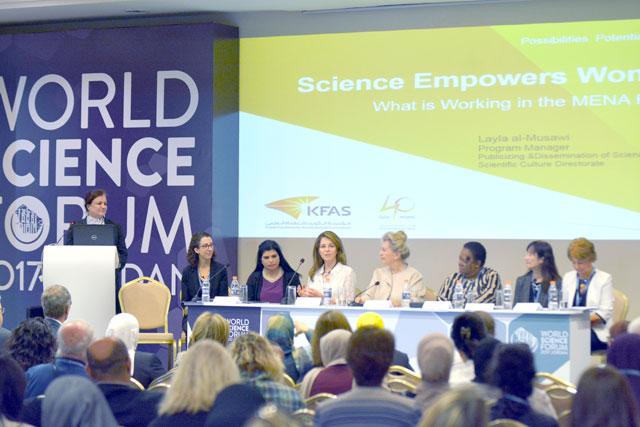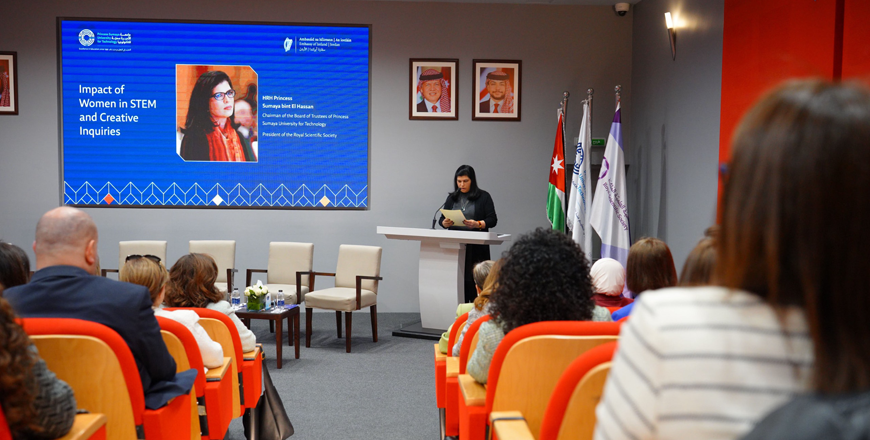You are here
Scientists examine gender gap in industry
By Mina Mohit - Nov 09,2017 - Last updated at Nov 09,2017

Her Majesty Queen Noor and HRH Princess Sumaya participate in a panel on 'Women as Leaders for Diversity and Development' at the King Hussein Bin Talal Convention Centre at the Dead Sea on Wednesday (Photo by Amjad Ghsoun)
DEAD SEA — About 117 people from around the world, 83 women and 34 men, packed the conference hall on Wednesday at the World Science Forum 2017 for a discussion panel on "Women as Leaders for Diversity and Development".
Her Majesty Queen Noor and HRH Princess Sumaya attended the panel, which consisted of a diverse group of female leaders in the fields of science, technology, engineering and mathematics (STEM).
During Her Majesty’s welcoming speech, she pointed to the men attending the session and said: “Seeing that this is not a room of only men, is indicative of what Jordan is; what is little understood about Jordan and our part of our world,” emphasising that “men and women have been working together in the fields of science for very long time”.
However, she also raised some of the challenges the country still faces, such as retaining talented women in the workforce right after graduation, which they are tackling by implementing various women-empowering initiatives and creating opportunities for dialogue.
The event’s speakers were strategically curated to represent the voices of female leaders from different regions such as Asia, Africa, Europe, North America and the Middle East.
“The community of science leaders must be diverse. Diversity among innovators increases the likelihood that the products and services created will contribute to sustainable peace and prosperity,” said panel moderator Katalin Bogyay, the permanent representative of Hungary to the UN.
Each speaker spoke about the particular challenges of women in STEM in their own region, provided socio-cultural context to those topics and recommended solutions.
“We should stop assuming that women are a minority, they are part of humanity, and ask why we aren’t using 50 per cent of our talent,” said Grace Naledi Pandor, South African minister of science and technology.
Pandor stressed to gather data on the number of women in STEM fields since “decisions rely on data”, highlighting how statistics can help shape policies. She also encouraged more women to stay in research, advance into PhDs and take part in fields where they are “scarce” such as those in nuclear science, statistical analysis.
The second speaker, Julia MacKenzie from the American Association for the Advancement of Science, built on Pandor’s argument but insisted that simply gathering the data to create change was not enough.
“We must scrutinise the data and ask more questions,” said MacKenzie, and asked: “Which of the women still don’t have access to these fields? Which fields of STEM are they more saturated in? Do they excel and hold leadership positions, if not, what’s holding them back?”
Kuwaiti Scientist Layla Al Musawi provided some answers to MacKenzie’s questions during her presentation, and gave a culture-specific insight into the lack of women in leadership roles.
“In the Middle East, we’ve been brought up to be shy and to have boundaries — at least in my generation— we were taught not to speak about our abilities,” said Musawi.
However, the Vice President of the European Research Council (ERC) Éva Kondorosi brought forward research that suggested the reason behind the lack of women in leadership roles to be less cultural and more gender specific.
She said that the ERC has found that more men apply for research grants, believed they could be “excellent leaders” and used “superlatives when they talked about themselves” in their applications, whilst women were more modest about their achievements and had a hard time to talk “enthusiastically about themselves”.
Kondorosi also shed light on a very common, yet often not spoken of issue that targets women in the workplace: she spoke about the problem of “unconscious bias” that inadvertently questions or discredits the hard work and merit of working women.
“For example, if a woman comes out with numerous and excellent publications, they will say that she’s collaborating with the head of department,” said Kondorosi.
The ERC vice president said that the elimination of such biases, more soft-skills training, more funding and the access to work-extensions during pregnancies can help pave the way for more women in leadership.
Ultimately, all six women on the stage reiterated that “hard work and extreme dedication” were the keys for achieving success, “regardless of gender”.
The message of the panel was loud and clear when Musawi concluded her speech with: “We hope that one day, we’re no longer talking about women in science.”.
Related Articles
DEAD SEA — Women scientists gathered at the Dead Sea for the World Science Forum 2017 on Friday agreed that women in the region need to work
AMMAN — HRH Princess Sumaya bint El Hassan, Chairman of the Board of Trustees of Princess Sumaya University for Technology, sponsored the ev
DUBAI — Zimbabwe’s Minister of Industry and Commerce Sekai Nzenza on Tuesday credited access to education for shaping her leadership capabil

















